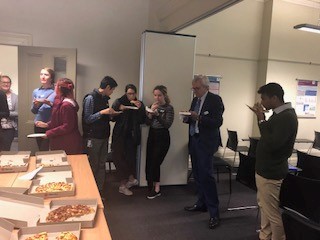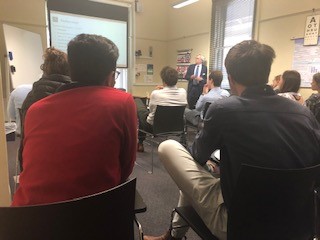Message from the Head of School
Dear Colleagues,
The Melbourne Medical School will hold its annual Planning Day this month and the theme is 'Disrupting Medical Education'.
I am looking forward to a lively discussion with Head of Schools, Directors and Managers about changes in the student landscape which necessitate changes to the current Doctor of Medicine (MD) curriculum to ensure we maintain our innovative edge.
Over the past few months I have held a number of sessions both locally and internationally with our current MD students, interns and alumni as far afield as London and New York to seek a more global perspective of the MD. These sessions have provided a wealth of feedback about the program and suggestions for proposed changes have been received from newly minted graduates to experienced clinicians across a range of specialities and settings. It was pleasing to see so many present and past students attend these events and take the time to provide thoughtful feedback on their own experiences and on future opportunities for the Melbourne Medical School.
I thought it would be timely to share with you some of the trends which have emerged in the feedback we have received to date which will be added to our thinking around a new structure for the MD.
It is clear that there is much that the Melbourne Medical School can be proud of in relation to the current MD program. The University's reputation for strong academic performance was regularly lauded as well as the solid evidence-based scientific practice underpinning delivery of the MD. It was also recognised by participants in a number of sessions that the Melbourne Medical School produces excellent generalists - it was also a firmly held belief that this should not become lost in any changes which are made to the curriculum. As you would expect, the annual student-led student conference which has received national and international acclaim also featured strongly in feedback. Similarly, it was noted that the current curriculum's use of long cases provides excellent preparation and training for the clinical environment.
Through the introduction of the MD Research Project our MD graduates are recognised as having research skills superior to their peers. It was heartening to hear alumni recalling great teachers and mentors they had learnt from during their MD training. It was clear that they still remember and highly value the teaching and guidance received from University and health service staff. Newer initiatives in the area of health and wellbeing and the level of pastoral care support offered in Clinical Schools were also recognised by current students and more recent graduates.
This feedback is very encouraging and provides a very solid platform from which to expand the Melbourne Medical School's vision for a future-proofed MD curriculum.
As you would expect, people have also been very willing to share areas where they consider there is room for improvement in the current MD program.
It resonated across feedback received that the Parkville campus is not the only reason for the passion students discover for medicine while undertaking the MD. The MD campus is roundly viewed as the relevant hospital or health service. Significant feedback has also been received about the Parkville based nature of MD1 subjects. These subjects are seen as having too much theory and not enough clinical exposure and context. Further, students felt that the current structure of first year lends itself to a focus solely on academic rather than clinical excellence which breeds high levels of competitiveness. Further, that the current structure is inflexible; lacking the ability for students to accelerate or revisit material as required. Whilst the MD Research Project is well received, many participants indicated that earlier opportunities for research exposure to encourage scientific and clinical skills from the outset would be highly beneficial. Graduates don't feel intern ready; they consider that they know what to do, but not how to do it.


In a new MD curriculum students and alumni have indicated that they would like to see an ungraded MD1 with an increased clinical context from day one. Greater breadth and multiple pathway opportunities (while recognising that some students will prefer the straight and narrow option) were also considered highly desirable. In line with the "learn anywhere, anytime" philosophy of current students of all disciplines, online delivery of interactive and clinically relevant content by leading clinicians was also regarded as a high priority. Increased focus on interprofessional experience, development of professional identity and leadership skills to produce graduates who are intern ready were further areas identified.
Work is well underway to explore new models in medical education to enhance the MD. The valuable contributions provided by current students, interns and alumni will be used to inform decision-making regarding the new curriculum. I'll continue to update you over the year as discussions about the new-look MD further progress.
I have been working in close partnership with the University's Research Innovation and Commercialisation (RIC) team, led by Ken Jefferd, to explore ways in which we can increase the quality and quantity of activity across the School that might be 'protected', licensed and commercialised. We hope soon to announce some parallel initiatives to be tested in the School, involving education, training and 'fast-tracking' good ideas to commercial outcomes – so watch this space.
Importantly, these initiatives will be available to students, professional and academic staff. The capability to identify, protect, support and commercialise our good research and education ideas, business process improvements, therapeutics and devices is central to any world-class medical school and university, and this is our clear aspiration.
Before closing, it is important to digress from discussion of the MMS's plans to acknowledge and congratulate our outstanding colleagues who were recognised recently for their distinctive contribution to scholarship and the wider community through the annual Queen's Birthday Honours list. Please join me in offering this year's recipients thanks and congratulations for their tireless work.
Best regards,
John.